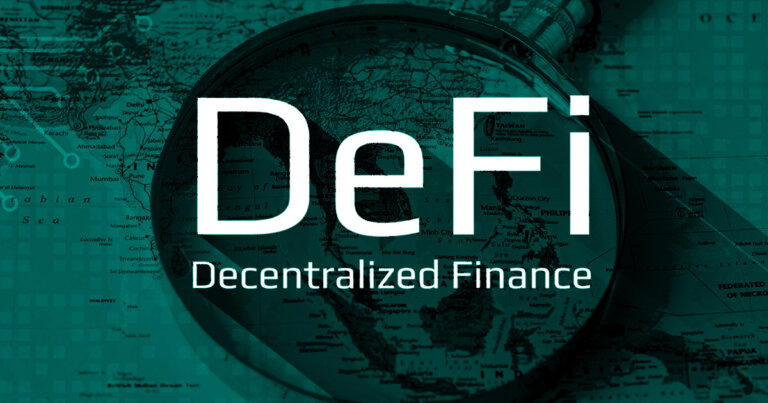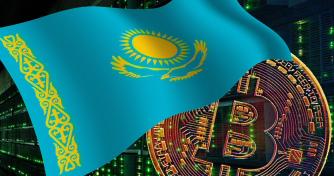 Binance, Kazakhstan agree on ‘wait-and-see’ approach in regulating DeFi
Binance, Kazakhstan agree on ‘wait-and-see’ approach in regulating DeFi Binance, Kazakhstan agree on ‘wait-and-see’ approach in regulating DeFi
The report suggests increasing collaboration between regulators, closing the knowledge gap, and creating a regulatory sandbox.

Cover art/illustration via CryptoSlate. Image includes combined content which may include AI-generated content.
Adopting a wait-and-see approach is the best way to regulate the DeFi space, according to a report by Binance and the National Bank of Kazakhstan.
While waiting to see how the market would develop, the pair suggested increasing the collaboration between the regulators, building and learning through a regulatory sandbox, and educating both the consumers and the lawmakers, according to their joint report titled “State of the Digital Assets Industry and DeFi in central Asia.”
Recommendations
Binance and Kazakhstan agreed that the best approach to regulating the DeFi space is to let it evolve on its own while spending time analyzing the space and experimenting with regulations.
The first suggestion of the report is to deepen collaboration between regulators and the participants of both traditional finance and DeFi. This would allow centralized and decentralized finance to find a way to co-exist together. Therefore, the report adopted a unifying perspective and stated:
“Decentralized exchanges will be bigger than centralized exchanges. However, in the future centralized and decentralized crypto protocols can co-exist as many people will still prefer the conventional methods of accessing their accounts.”
In the spirit of co-existing, the report suggested building a regulated, user-friendly infrastructure that bridges the two spheres as the second step. This infrastructure will bring CeFi and DeFi closer by facilitating crypto-to-fiat transactions.
Another suggestion encourages building a regulatory sandbox to test and learn while running joint research and development projects to study the DeFi space. Gaining expertise in these areas will allow further development by bringing legal clarity to DeFi-related activities.
Finally, the report mentioned the importance of improving consumers’ financial and digital literacy while closing the crypto knowledge gap of lawmakers.
Wait and see
To see how the world attempts to regulate the crypto sphere, the report took a detailed look into various regulatory frameworks from around the world and categorized them under three main approaches:
- Applying traditional regulatory frameworks
- Composing a new framework that addresses the challenges listed above
- Adopt a “wait and see” approach
The report argued “imposing regulations that are not fit for purpose” will stifle innovation in the DeFi ecosystem. Composing a new framework is also suspended because it “seems premature at this stage because public authorities, as well as the ecosystem, need more time to understand all the use cases linked to DeFi .”
Therefore, the report concluded that the third option is the best choice lawmakers can make now.
Regulatory challenges
DeFi allows users to enter into financial transactions without intermediaries and lend or borrow money from their peers. Since it doesn’t rely on an official entity, it is hard to regulate the Defi space. According to the report, DeFi’s nature poses several challenges to the regulators.
First of all, the lack of financial and digital literacy of users, regulators’ lack of crypto knowledge, irrational behavior of investors, legitimacy of the data provided by oracles, lack of decentralization, and financial stability risks like liquidity runs from the banking system that stem from the fiscal policies are among the emerging trends that challenge the regulators.
Secondly, there are financial, technical, and operational risks to participants, stakeholders, and the overall market, which pose various challenges to regulators. Risks like market manipulation, technical failures, forks, vulnerabilities of the governance systems, scams, fish-loan attacks, and cyber attacks must be addressed.
Binance and Kazakhstan
Binance and Kazakhstan started to form a partnership in mid-2022. In May 2022, Binance CEO Changpeng Zhao (CZ) personally visited the country to meet its President and many prominent lawmakers.
At the time, CZ acknowledged Kazakhstan as “one of the world leaders in the crypto industry.” CZ also said Binance would work together with the lawmakers of the country to contribute to the development of crypto in the region.
In October 2022, Kazakhstan started testing its Central Bank Digital Currency (CBDC), Digital Tenge, on the BNB Chain (BNB).




 Arkham Intelligence
Arkham Intelligence 

 Farside Investors
Farside Investors 
 CryptoQuant
CryptoQuant 
 CoinGlass
CoinGlass 

































































































